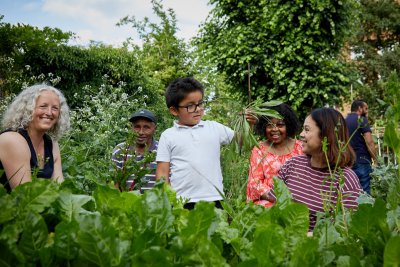Councils
Capital Growth supports London’s councils to promote and expand opportunities for their residents to grow their own and green their neighbourhoods

As London's food growing network, we spotlight councils taking leadership and inspire other local authorities to do more so that every Londoner has a chance to grow their own food, regardless of their location.
Read on for what councils can do, case studies and why councils should support food growing as well as information on peri-urban food production through our Fringe Farming report.
What can councils do
1. Join Capital Growth's inter-council network
This provides advice, inspiration and cross-council learning through quarterly meetings. Contact rachel.dring@sustainweb.org to join.
2. Promote Capital Growth's work
Encourage your local gardens to join for free, to access support, training, raise the profile of their project and attract more volunteers.
3. Download the toolkit
Access useful information, links and signposting to help councils support food growing initiatives.
Case studies
Read our short case studies of how councils are supporting food growing through dedicated officer time, partnership working and policy intervention.
Southwark Council
Right to Grow: Southwark council has become the first London borough to pass the Right to Grow motion. This decision is a recognition of the significant role community growing plays in creating essential habitat for nature and generating immense social value and access to fresh fruit and veg in a cost-of-living crisis. This is the culmination of four years of groundwork laid by Southwark Council’s community gardening team, which set up a process in 2021 for residents on estates to set up and run growing projects with council support, which has led to 21 new gardens with 241 food growing plots with more in development. The Community Gardening officer role was established in 2020 and is the main point of contact in the council for growing enquiries, working closely with other council teams on strategy and project delivery, and sharing information, funding and training opportunities to residents. To support new and existing gardening groups and organisations through a Southwark network the two part-time officers organise a busy calendar of events and training, from community organising to composting; connecting individuals with projects and organisations and promoting peer-to-peer support. They’re a thriving example of how even built-up inner-city boroughs can carve out pockets of land for food growing.
Food Growing Contact: Ruth.Arnott@southwark.gov.uk
The Royal Borough of Kensington & Chelsea
Dedicated officer time:
The Ecology Service at RBK&C manages 55 community kitchen gardens, supported by a team of four paid Community Gardeners. Installed in housing estates, parks, hospital grounds and other green spaces, the provide over 650 plots for residents and community groups to use primarily for food growing.
The Council’s Community Gardeners provide gardening advice, support and regular workshops for plot holders. They also work to improve the wider garden environment, creating habitats such as wildlife ponds, fruit trees, and pollinator-friendly companion planting as well as installing composting and water collection systems to increase sustainability.
The food growing plan for the borough is integrated into the Council’s Biodiversity Action Plan and the community kitchen gardens also play a vital role in delivery of other biodiversity targets and resilience to climate change.
Working in collaboration with Hammersmith Community Gardens Association, the Community Kitchen Gardens project also delivers a school food growing programme in six primary schools, with plans to double the number of participating schools in 2024.
Food Growing Contact: Alice.Laughton@rbkc.gov.uk
Barking & Dagenham Council
Partnership working:
In the summer of 2023, the London Borough of Barking & Dagenham supported three community enterprises to activate a food growing programme in the borough. They held community events and outreach surveys to assess food growing needs and challenges and have recommended four new growing projects that respond to local need. All of these “seed” projects will receive a mixture of expertise, guidance and equipment to develop their projects.
Partnership working is central to LBB&D’s ethos. They continue to work in partnership with Growing Communities on a variety of initiatives, which runs Dagenham Farm. Dagenham Farm was established in 2012 on an ex-council plant nursery and now produces organic food closer to where people actually live as well as helping new entrants to farming and engaging local people in food growing.
From January to July 2023, School Food Matters worked with schools in Barking and Dagenham to deliver food growing and enterprise programmes in primary and secondary schools.
In addition to this, LBB&D continue to maintain Eastbrookend Orchard with a dedicated park ranger and a volunteer programme.
Food Growing Contact: Joanna.Wilson@lbbd.gov.uk
Hounslow Council
Partnering with the voluntary sector: Grow For The Future is an initiative by the Borough of Hounslow to transform unused council land to grow food and educate children on healthy living. Funded by the UK Shared Prosperity Fund –part of the UK Government’s Levelling Up agenda, the project is enabling local communities to grow food whilst being responsive and culturally reflective of the communities they serve.
Each new growing site is paired with a local school or VCSE group which have limited access to green space and to encourage individuals to get active, get involved and participate in local community food growing. The Grow for The Future highlights the need to educate children and residents about their ability to contribute to food growing, share their skills and knowledge and allow them to lead from the front.
"With cities expanding rapidly there is a need for education on where our food comes from, how we can utilise small spaces to grow our own food and the ability to pass on the power."
Food Growing Contact: Nabeela.Mulbocus@hounslow.gov.uk
Why should councils support food growing?
Supporting residents, community groups and organisations to access land for food growing has a number of key benefits across council objectives including:
- Access for residents to healthy, local food;
- Healthy and active residents;
- Resilient and mentally healthy communities;
- Safer, cohesive communities;
- Greener and environmentally sustainable communities.
We developed a toolkit including useful information, links and signposting to help councils support food growing initiatives. We also have a briefing on Councils and Community Food Growing or you can watch our webinar.
Supporting Fringe Farming
There are specific benefits to supporting Fringe Farming, defined as agroecological farming at the edge of cities. Growing food on peri-urban land can help support a strong local food system by increasing green jobs, improving access to food, and supporting climate resilience. Read our new Fringe Farming briefing to learn the economic, social and environmental benefits to agroecological peri-urban food production.
Download the new Fringe Farming briefing
For a deeper dive into this topic, you can explore our full Fringe Farming report: peri-urban agroecology towards resilient food economies and public goods.
Support our work
Your donation will help communities grow more food in gardens across London.
Capital Growth is a project of Sustain: the alliance for better food and farming.




